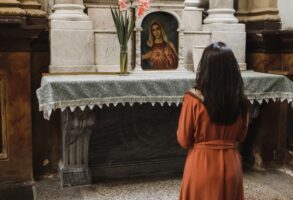
Published September 3, 2020
For much of this strange and difficult year, my colleagues at The Catholic Project (Catholic University’s response to the abuse crisis) and I have been working to produce a podcast. It is called “Crisis: Clergy Abuse in the Catholic Church” and the first episode launches next Wednesday, September 9.
I must say, I am very proud of our efforts. (You can listen to the trailer, here.)
The idea behind the podcast was straightforward: create an audio documentary that could help Catholics (or anyone else, for that matter) get their heads around what has been happening in the Church. As the tumult of 2018 (McCarrick, the Pennsylvania Grand Jury Report, Vigano’s testimony) began to subside, and as time provided clarity of perspective, we thought it important to try to give a reasonably comprehensive account of what has been going on in our Church, how we got to this point, and where we might hope to go from here.
There are myriad other questions we explore, too: What were the causes of the abuse crisis? Has the Dallas Charter really made children safer? Are new measures intended to bring accountability to bishops likely to be effective? What does justice for survivors look like? How does the crisis change our view of our priests and bishops? Has it changed how they see themselves and their ministries? Given what the Church claims to be – one, holy, catholic, apostolic – how ought we to understand the abuse crisis? How does the crisis change our understanding of the Church itself?
To help us tell the story of the crisis – to tell the stories that make up this bigger story – we interviewed as wide a range of guests as we could. The crisis has deepened and exacerbated existing divisions within the Church. (You have probably noticed this. But if you don’t believe me, try starting a reasonable conversation online about the role homosexuality played in the abuse crisis.) We wanted to address as many facets of the story as we could, so that listeners could both gain clarity where it was lacking, and also appreciate the nuance that is too often lost amidst the ideological noise.
Our guests include Tom Roberts, who had the National Catholic Reporter covering the abuse crisis when it was scandalous to do so. We spoke to Greg Erlandson and Phil Lawler, George Weigel and Jason Berry. We spoke to the men who led the bishops’ conference during the acute crises of 2002 and 2018 (Archbishop Wilton Gregory and Cardinal Daniel DiNardo, respectively).
We interviewed Ray Mouton, the lawyer who defended Gilbert Gauthe, the first priest in the United States criminally indicted for the sexual abuse of minors. Mouton later co-authored a report warning the U.S. bishops of the massive legal, moral, and financial liabilities posed by the abuse crisis. That was in 1985. The report was ignored.
We spoke with Kim Daniels, who worked with the Holy See in planning the abuse summit held at the Vatican in February 2019. And we interviewed James Grein, the man who had the courage to go public in 2018 with allegations that Theodore McCarrick had sexually abused him beginning when Grein was just 11.
All of these guests appear in just the first two episodes.
Some guests will enthrall you; some might frustrate you. Some will be well known to you and others are people you’ve probably never heard of: theologians, canonists, abuse survivors, clinicians, priests, historians, and victims’ assistance coordinators.
We are still finishing the final episodes (there will be ten, in all) so I couldn’t spoil the “ending” for you if I wanted to. But I can promise there will not be a nice easy resolution to the stories we are telling. The story of the abuse crisis is not something one can wrap a bow on and call it “finished.” The Church continues to suffer. Men and women continue to suffer. Evil persists; sin persists. Many an exasperated “Why?” and “How?” will go unanswered.
But there’s clarity in that, too. Suffering is not merely a problem to be solved; it is a mystery to be entered into. In this light, the difficulty of these past two years – these past decades, really – is like all moments of suffering and tragedy, also an opportunity for grace. To say as much is either a declaration of foolishness or faith. I don’t see how there’s a middle ground.
To conclude, let me beg your indulgence. The small team that has worked so hard to make this podcast (and during COVID times) deserves a word of thanks. It is not a pleasant thing, to spend months on end sifting through the scattered history and human wreckage caused by the abuse crisis.
The host of the podcast is Karna Lozoya. Karna is a veteran of various chanceries and Catholic media operations who now handles strategic communications for President John Garvey at Catholic University. She didn’t have to make herself the face – or, rather, the voice – of a podcast about an issue so charged with controversy and pain. But she did. And she’s as steady and reliable a narrative guide as one could hope for on this podcast. She has my thanks and admiration.
Our producer, Jeff Gasser, has been patient and diligent and reliable and flexible and many other things besides. David Freddoso who helped write our first several episodes, and Sara Perla, who took over writing duties after David (along with her myriad other duties), have had the seemingly impossible task of weaving recorded interviews into one coherent story, which, in turn, must be narrated in a voice that is not their own. Their patience has been admirable; their labors, commendable.
Last but not least, I invite you all to check out “Crisis: Clergy Abuse in the Catholic Church” when it launches next Wednesday. It will be available from Apple, Spotify, Stitcher, and wherever else you find your podcasts. Please listen and subscribe. Again, you can find it at our website here: https://catholicproject.catholic.edu/podcast/
© 2020 The Catholic Thing.
Stephen P. White is executive director of The Catholic Project at The Catholic University of America and a fellow in Catholic Studies at the Ethics and Public Policy Center.









